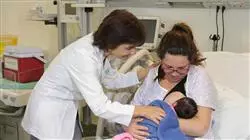University certificate
The world's largest faculty of nursing”
Introduction to the Program
Don’t miss this opportunity to study in the biggest private online university”

It is important to recognize postpartum physiology is a key element to identify early signs of risk and to prevent complications or to act as effectively and quickly as possible before those complications may arise.
Therefore, the main complications that may arise in the postpartum period are reviewed, with emphasis on clinical medicine, the risk factors of these complications, the treatment and the care provided by nurses in each one of them.
Although it is less common to work with high-risk patients or with associated postpartum diseases in some hospitals, it is essential for nursing professionals to be familiar with pathological processes during this period. Many of these complications can also arise within the framework of low-risk childbirth care, so the identification of these problems and early and accurate management by professionals is crucial to provide quality care for both the mother and her newborn.
Additionally, the pelvic floor also occupies an important place in nursing care, especially as part of their health center practice. It has a special relevance during the postpartum period, where women often perceive the effects that pregnancy and vaginal childbirth have had on the perineum.
In this sense, this TECH Postgraduate diploma offers students a comprehensive view of the postpartum nursing from a theoretical and eminently practical perspective. The program is divided into multiple modules, making up a total of topics in which the student will acquire a global and deep knowledge of the subject.
This program may be useful for students seeking an initial postgraduate specialization program, specifically in postpartum studies, or for people who are developing their profession in this field and decide to catch up by studying a fully up and to-date program that includes all the new developments in force up to the date of its release and which, in addition, is committed to continuous updating to include all future developments.
It is, therefore, not just another qualification for your professional profile, rather, a real learning tool to approach the specialty topics in a modern, objective way and with the ability to make a judgment based on today's most cutting-edge literature.
We have the best educational material, allowing you a contextual study that will facilitate your learning”
This Postgraduate diploma in Postpartum Physiology and Pathology for Nursing contains the most complete and up-to-date scientific program on the market. The most important features include:
- Practical cases presented by experts in Postpartum Nursing
- The graphic, schematic, and practical contents with which they are created, provide scientific and practical information on the disciplines that are essential for professional practice
- Latest advances in Postpartum Physiology and Pathology for Nursing
- Practical exercises where self-assessment can be used to improve learning
- A special emphasis on innovative methodologies in Postpartum Physiology and Pathology for Nursing
- Theoretical lessons, questions to the expert, debate forums on controversial topics, and individual reflection assignments
- Content that is accessible from any fixed or portable device with an Internet connection
Combine your studies with your professional work while increasing your knowledge in the field of postpartum care thanks to this 100% online Postgraduate diploma”
The teaching staff includes professionals from the field of Postpartum Nursing, who contribute their work experience to this program, as well as renowned specialists from leading societies and prestigious universities.
The multimedia content, developed with the latest educational technology, will provide the professional with situated and contextual learning, i.e., a simulated environment that will provide immersive training programmed to learn in real situations.
This program is designed around Problem-Based Learning, whereby professionals must try to solve the different professional practice situations that arise throughout the program. To this purpose, professionals will be assisted by an innovative interactive video system developed by renowned and experienced experts in Postpartum Physiology and Pathology for Nursing.
Combine your studies with your professional work while increasing your knowledge in the field of postpartum care thanks to this 100% online Postgraduate diploma”

Care of the woman after childbirth must be carried out with extreme care, due to the pathologies that may arise in Postpartum"
Why study at TECH?
TECH is the world’s largest online university. With an impressive catalog of more than 14,000 university programs available in 11 languages, it is positioned as a leader in employability, with a 99% job placement rate. In addition, it relies on an enormous faculty of more than 6,000 professors of the highest international renown.

Study at the world's largest online university and guarantee your professional success. The future starts at TECH”
The world’s best online university according to FORBES
The prestigious Forbes magazine, specialized in business and finance, has highlighted TECH as “the world's best online university” This is what they have recently stated in an article in their digital edition in which they echo the success story of this institution, “thanks to the academic offer it provides, the selection of its teaching staff, and an innovative learning method aimed at educating the professionals of the future”
A revolutionary study method, a cutting-edge faculty and a practical focus: the key to TECH's success.
The most complete study plans on the university scene
TECH offers the most complete study plans on the university scene, with syllabuses that cover fundamental concepts and, at the same time, the main scientific advances in their specific scientific areas. In addition, these programs are continuously being updated to guarantee students the academic vanguard and the most in-demand professional skills. In this way, the university's qualifications provide its graduates with a significant advantage to propel their careers to success.
TECH offers the most comprehensive and intensive study plans on the current university scene.
A world-class teaching staff
TECH's teaching staff is made up of more than 6,000 professors with the highest international recognition. Professors, researchers and top executives of multinational companies, including Isaiah Covington, performance coach of the Boston Celtics; Magda Romanska, principal investigator at Harvard MetaLAB; Ignacio Wistumba, chairman of the department of translational molecular pathology at MD Anderson Cancer Center; and D.W. Pine, creative director of TIME magazine, among others.
Internationally renowned experts, specialized in different branches of Health, Technology, Communication and Business, form part of the TECH faculty.
A unique learning method
TECH is the first university to use Relearning in all its programs. It is the best online learning methodology, accredited with international teaching quality certifications, provided by prestigious educational agencies. In addition, this disruptive educational model is complemented with the “Case Method”, thereby setting up a unique online teaching strategy. Innovative teaching resources are also implemented, including detailed videos, infographics and interactive summaries.
TECH combines Relearning and the Case Method in all its university programs to guarantee excellent theoretical and practical learning, studying whenever and wherever you want.
The world's largest online university
TECH is the world’s largest online university. We are the largest educational institution, with the best and widest online educational catalog, one hundred percent online and covering the vast majority of areas of knowledge. We offer a large selection of our own degrees and accredited online undergraduate and postgraduate degrees. In total, more than 14,000 university degrees, in eleven different languages, make us the largest educational largest in the world.
TECH has the world's most extensive catalog of academic and official programs, available in more than 11 languages.
Google Premier Partner
The American technology giant has awarded TECH the Google Google Premier Partner badge. This award, which is only available to 3% of the world's companies, highlights the efficient, flexible and tailored experience that this university provides to students. The recognition as a Google Premier Partner not only accredits the maximum rigor, performance and investment in TECH's digital infrastructures, but also places this university as one of the world's leading technology companies.
Google has positioned TECH in the top 3% of the world's most important technology companies by awarding it its Google Premier Partner badge.
The official online university of the NBA
TECH is the official online university of the NBA. Thanks to our agreement with the biggest league in basketball, we offer our students exclusive university programs, as well as a wide variety of educational resources focused on the business of the league and other areas of the sports industry. Each program is made up of a uniquely designed syllabus and features exceptional guest hosts: professionals with a distinguished sports background who will offer their expertise on the most relevant topics.
TECH has been selected by the NBA, the world's top basketball league, as its official online university.
The top-rated university by its students
Students have positioned TECH as the world's top-rated university on the main review websites, with a highest rating of 4.9 out of 5, obtained from more than 1,000 reviews. These results consolidate TECH as the benchmark university institution at an international level, reflecting the excellence and positive impact of its educational model.” reflecting the excellence and positive impact of its educational model.”
TECH is the world’s top-rated university by its students.
Leaders in employability
TECH has managed to become the leading university in employability. 99% of its students obtain jobs in the academic field they have studied, within one year of completing any of the university's programs. A similar number achieve immediate career enhancement. All this thanks to a study methodology that bases its effectiveness on the acquisition of practical skills, which are absolutely necessary for professional development.
99% of TECH graduates find a job within a year of completing their studies.
Postgraduate Diploma in Physiology and Pathology in the Puerperium for Nurses
The Postgraduate Diploma in Physiology and Pathology in the Puerperium for Nursing is a high quality program offered by TECH that aims to train nursing professionals in the physiological and pathological aspects of the puerperium. TECH is known for its academic excellence and its commitment to innovation and technology in online training, which allows students to access quality training regardless of their geographical location. This postgraduate degree is completely online, which offers students the flexibility to study from anywhere and at any time that is convenient for them. In addition, TECH's online platform is designed so that students can interact with their peers and professors, which fosters collaborative learning and discussion of current topics.
Specialize in physiology and pathology in the postpartum period.
During the program, students will acquire advanced knowledge about the physiology of the puerperium, the changes that occur in a woman's body after childbirth and the pathologies that can occur during this stage. Topics such as newborn care and postpartum care in emergency situations will also be addressed. TECH's Postgraduate Diploma in Physiology and Pathology in the Puerperium for Nursing is a highly specialized program that allows Nursing professionals to update their knowledge and skills in a fundamental area of their clinical practice. In addition, being a completely online program, students can continue to work and apply what they learn in their daily practice. If you are a Nursing professional interested in updating your knowledge in the physiology and pathology of the puerperium, this postgraduate program is an excellent option. With TECH's online training, you will be able to access high quality training and adapt your studies to your schedule and needs. Do not hesitate to enroll and advance in your Nursing career.







